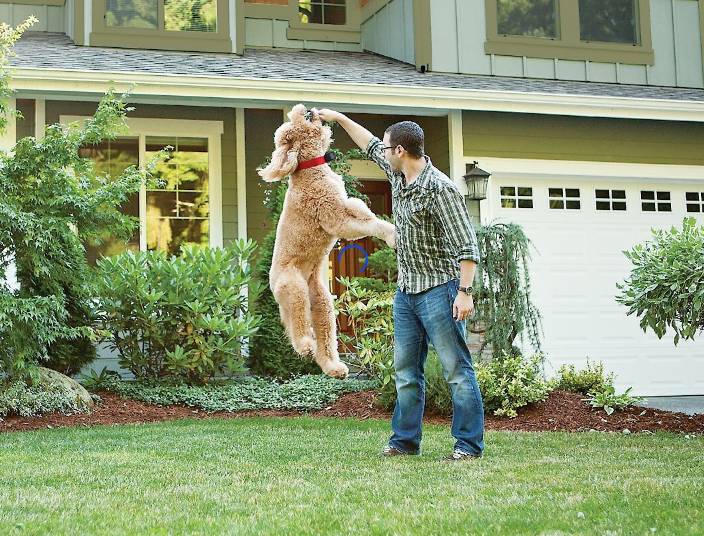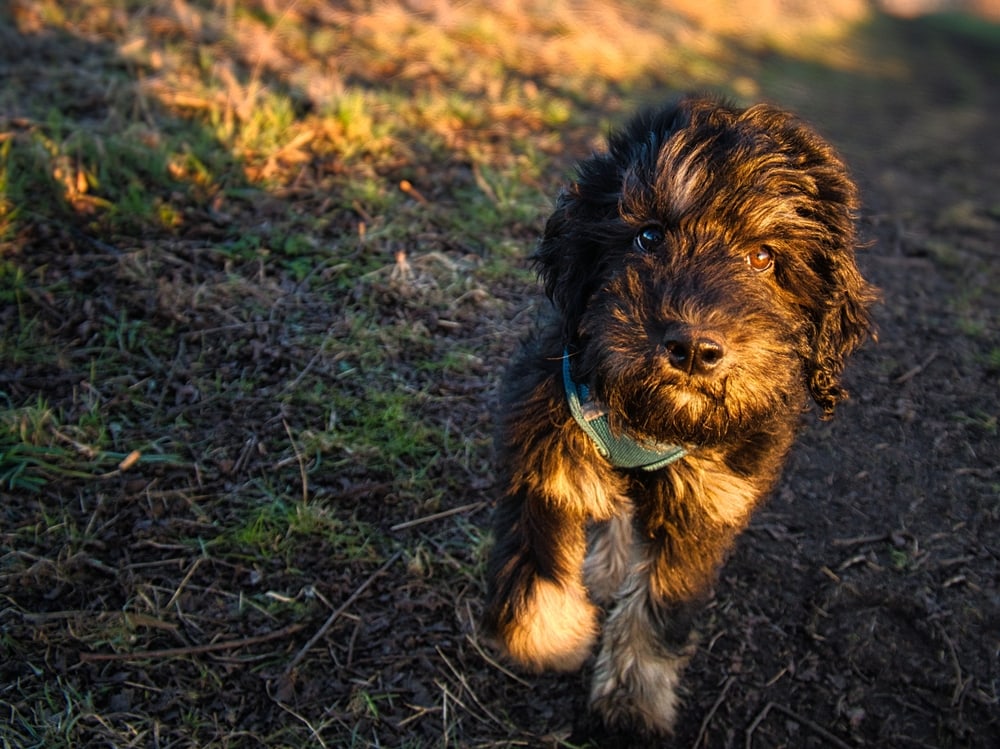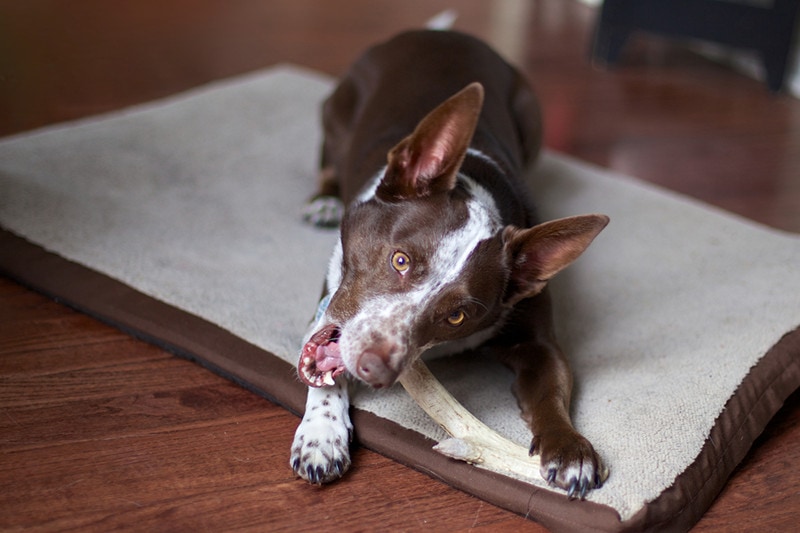Why Do Dogs Smell Bad When Wet? 10 Vet-Reviewed Reasons & What to Do

Updated on
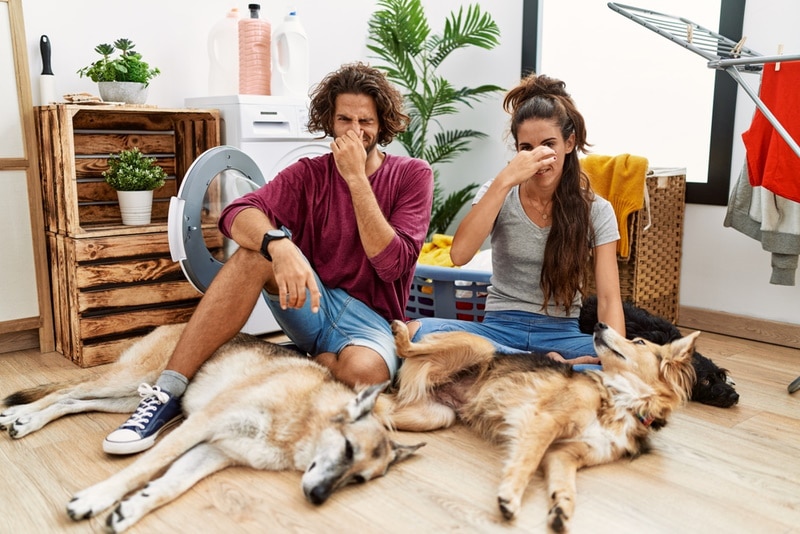
Click to Skip Ahead
It’s no secret that dogs can have a distinct smell, especially when they’re wet. You may have noticed this smell after giving your dog a bath, taking them for a swim, or even just walking them in the rain!
But what causes this smell? And is there anything you can do to prevent it? In this article, we’ll explore 10 possible reasons why dogs smell bad when wet, some of which are more anecdotal than others, and provide some tips on how to prevent or stop the wet dog smell!
Click to skip ahead:
What Is “Wet Dog Smell”?
The wet dog smell is a distinctive odor that many dog owners are familiar with. It’s usually described as a musty, sour, or damp odor that becomes more intense when a dog’s coat is wet. This odor is probably caused by a combination of factors that we will later explore, including natural oils, bacteria, and dead skin cells.
The 10 Possible Reasons Dogs Smell Bad When Wet
1. Natural Oils
Like us humans, dogs have natural oils in their skin that help protect their fur and keep it healthy. When a dog’s coat is wet, these oils are released, and they can give off a bad smell. The oils mix with water and create a damp, musty odor that can linger even after the dog has dried off.
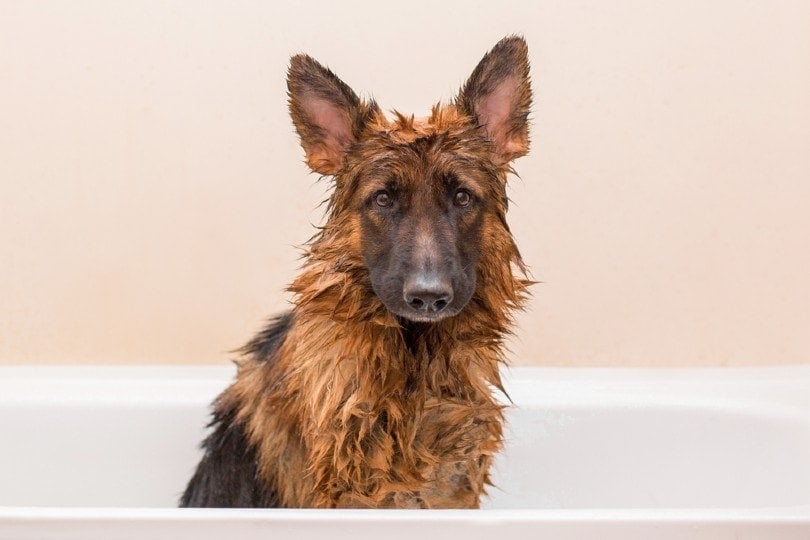
2. Bacteria
When a dog’s coat is wet, it becomes an ideal environment for bacteria to grow. Bacteria and the substances they produce can cause bad odors that are difficult to get rid of. The bacteria can also cause skin infections and other health issues if their numbers get out of control or if there is a skin injury.
Whether clean or dirty, it is normal for some bacteria to be present on your dog’s skin. What’s important is that we don’t provide them with the proper environment to grow and potentially cause harm, making it important to observe good pet hygiene!
3. Dead Skin Cells
Dogs naturally shed skin cells, and when these cells mix with water, alongside the oils and natural bacterial flora, they can create a sour, musty odor. Wet fur can trap dead skin cells, which can contribute to bad smells.

4. Anal Glands
Dogs have two small sacs located on either side of their anus that produce a strong-smelling liquid, most likely used to mark territory and leave a particular scent during defecation. When a dog is wet and scared or anxious while having a bath they don’t enjoy, they may express their anal glands, giving off a strong, unpleasant odor, thus contributing to wet dog smell.
5. Swimming
Dogs that swim in ponds, lakes, or rivers may come into contact with algae, bacteria, or other substances that can cause a bad odor. If your dog loves to swim, it’s important to rinse them off with clean water after they’re done to remove any potential sources of odor.

6. Damp Fur
When a dog’s fur is wet and not properly dried, it can stay damp for a little while. Damp fur can create an ideal environment for bacteria and fungi to grow, and due to mixing with water, all the released compounds can again lead to unpleasant odors as they are slowly evaporating from the coat.
7. Diet
Aside from skin factors, Did you know that a dog’s diet can also affect their odor?
Dogs that eat a lot of fish or other strong-smelling foods may have a stronger body odor. It’s important to feed your dog a balanced diet that meets their nutritional needs to help reduce odors.
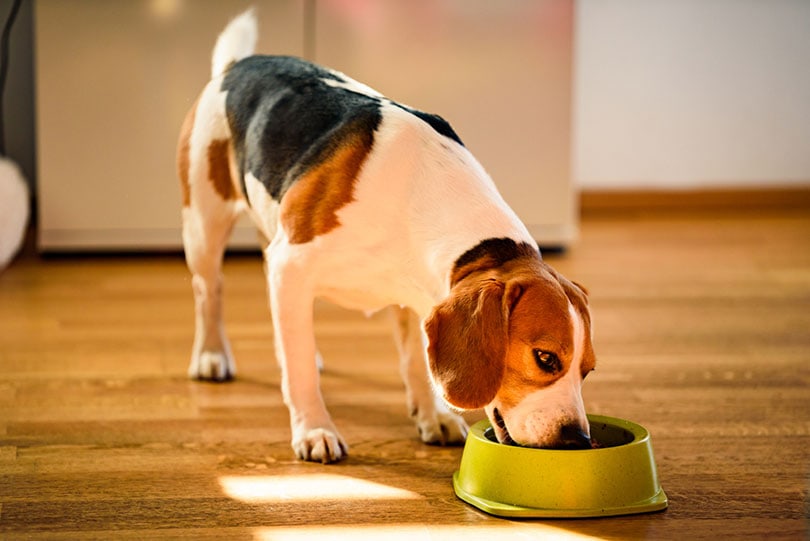
8. Fungal Infections
Similar to bacteria, wet conditions can also encourage the growth of fungi that can cause infections and unpleasant odors. Fungal infections can be particularly common in dogs with thick, double coats, skin folds, underlying skin conditions, or those that spend a lot of time in damp environments.
Like bacteria, proper hygiene and drying are key to preventing any fungal complications. Still, fungus, as well as bacteria, make up the normal skin flora in dogs and do not cause any issues if the skin is healthy.
9. Poor Hygiene
Dogs that are not regularly groomed or bathed may have a stronger odor when they get wet, particularly if they have excessive skin folds or underlying health issues. Regular grooming, including brushing and bathing certain body areas or the whole body, can help reduce odors and keep your dog’s coat healthy and clean. Aside from the odor prevention, proper hygiene and grooming can ensure that any skin conditions are picked up early! However, too frequent bathing can also be harmful, as it will cause a disbalance in the natural skin oils and may lead to dry skin.
10. Your Breed Is Known to Smell
Some dog breeds are simply more prone to having a stronger odor than others. Breeds with naturally oily skin or thick, dense coats, like Basset Hounds, may be more likely to develop a wet dog smell.
Additionally, dogs with skin folds or wrinkles, such as Bulldogs and Pugs, may be more prone to developing bacterial or fungal infections that can cause odors.
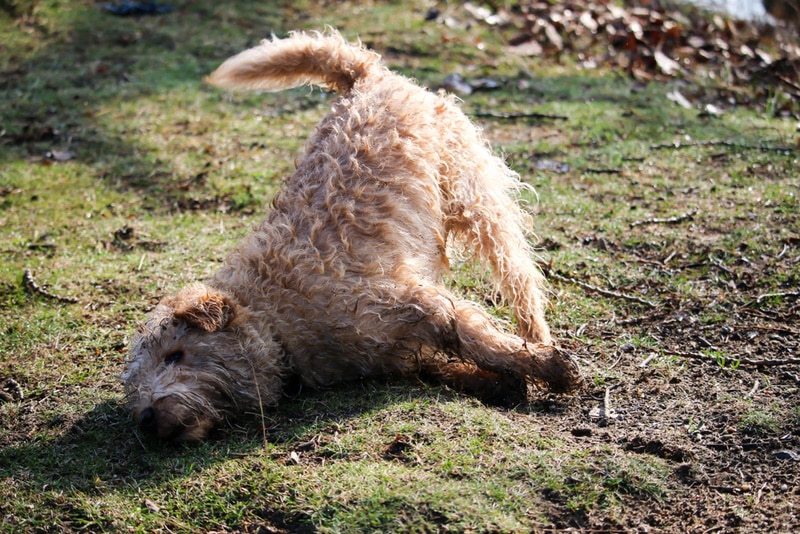
What Other Breeds Smell Worse Than Others?
While all dogs can develop a wet dog smell, some breeds are more prone to it than others. As we all know, different breeds have different physical characteristics, including their skin and coat!
Dogs with thick, double and triple coats, such as Retrievers and Alaskan Malamutes, are more likely to develop a strong odor when wet. Brachycephalic breeds with wrinkled skin and excessive folds, such as Bulldogs and Shar-peis, can also be prone to developing bad odors due to trapped moisture and bacteria.
Top 5 Tips on How to Prevent or Stop Wet Dog Smell
While you can’t completely eliminate the wet dog smell, there are several things you can do to prevent or reduce it!
1. Regular Grooming and Good Hygiene
Regular grooming can help remove dead skin cells, excess oils, and dirt that can contribute to a bad odor. Brushing your dog’s coat regularly can also help distribute natural oils throughout their fur, keeping it healthy and clean.
Bathing your dog regularly can help remove dirt, bacteria, and other substances that can contribute to bad odors. However, it’s important not to over-bathe your dog, as this can strip their coat of natural oils, leading to dry, itchy skin.
For proper grooming and hygiene advice, consult with your veterinarian for the best approach to take!
2. Use of Pet-Friendly Shampoo
When bathing your dog, make sure to use a pet-friendly shampoo that won’t irritate their skin or strip their coat of natural oils. Look for a shampoo that is specifically designed to neutralize odors and is vet-approved.
Some dogs may also have sensitive skin, so be sure to choose the best, high quality shampoo for your furry friend!
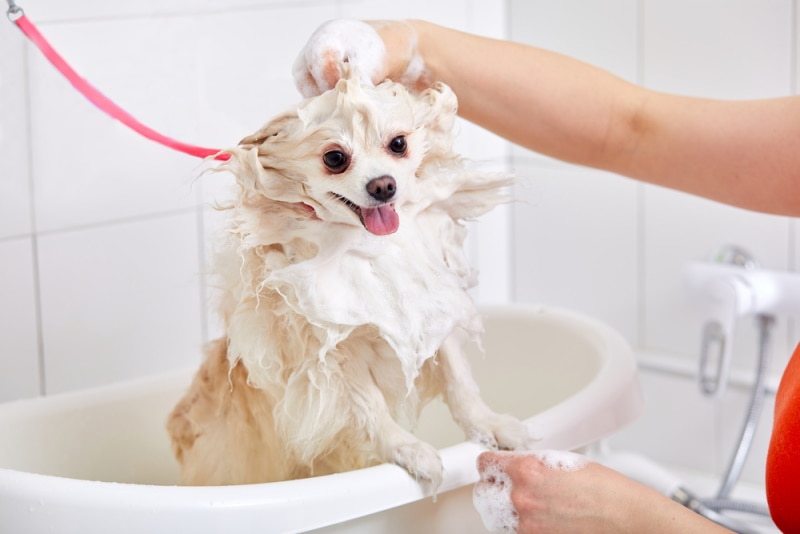
3. Thoroughly Dry Your Dog
Seeing that bacteria, fungi, and damp fur can cause a wet dog smell, it’s important to dry them thoroughly to prevent a damp, musty odor.
Use a towel to remove as much moisture as possible, and then use a blow dryer on a low setting to dry their coat completely, but make sure it’s from a safe distance to avoid burning the skin.
4. Address Skin Infections
If your dog has a skin infection or other health issue that is causing a bad odor, it’s important to address it promptly. Work with your veterinarian to develop a treatment plan that can help eliminate the infection and reduce odors while identifying the underlying cause!
5. Feed Your Dog a Healthy and Balanced Diet
A healthy and balanced diet with proper exercise can help keep your dog fit and healthy. Aside from their overall health, a nutritious diet can also promote skin health that can potentially reduce any unwanted wet dog smell.
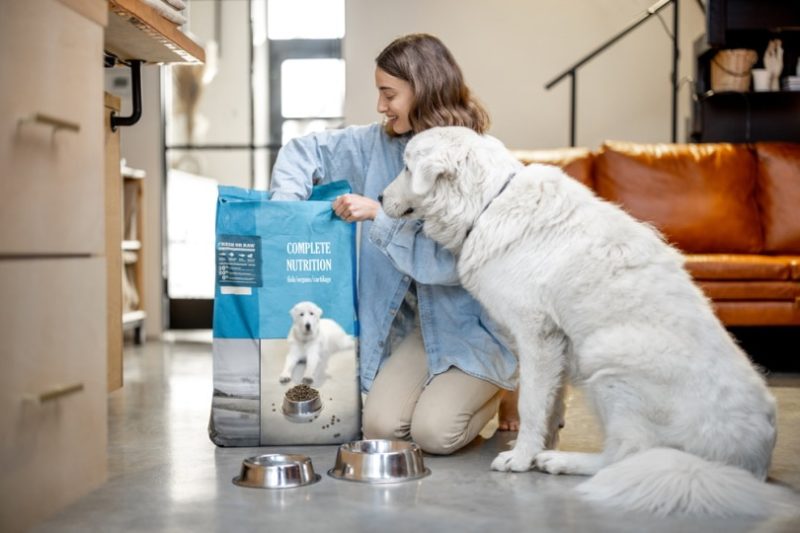
Conclusion
The wet dog smell can be unpleasant, but it’s a natural part of having a dog. By understanding the common causes of this odor and taking steps to prevent it, you can keep your dog smelling fresh and clean.
By working with your veterinarian and taking good care of your dog’s skin and coat, you can help prevent infections and other health issues that can contribute to bad odors. With a little effort, you can keep your dog smelling great and enjoying all the activities they love, even when they get wet.
Featured Image Credit: Krakenimages.com, Shutterstock




